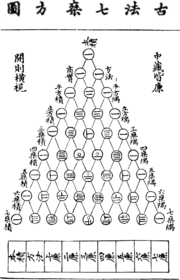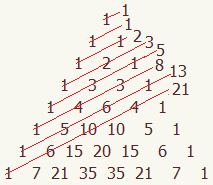Pascal's Triangle
Pronunciation: /pɑˈskɑlz ˈtraɪˌæŋ.gəl/ ExplainPascal's triangle is a simplified version of the binomial theorem. Pascal's triangle starts at row 1 with the number 1. The second row contains two numbers: 1 and 1. In each iteration, adjacent values are added together to make the number for the next iteration.
|
Pascal's triangle in the western world is named for the French mathematician Blaise Pascal. However, it was studied earlier in India, Persia, China, and Italy. See figure 2. Properties of Pascal's Triangle
|
|
References
- McAdams, David E.. All Math Words Dictionary, Pascal's triangle. 2nd Classroom edition 20150108-4799968. pg 135. Life is a Story Problem LLC. January 8, 2015. Buy the book
- pascal's triangle. merriam-webster.com. Encyclopedia Britannica. Merriam-Webster. Last Accessed 12/3/2018. http://www.merriam-webster.com/dictionary/pascal's triangle. Buy the book
Cite this article as:
McAdams, David E. Pascal's Triangle. 4/27/2019. All Math Words Encyclopedia. Life is a Story Problem LLC. http://www.allmathwords.org/en/p/pascalstriangle.html.Image Credits
- All images and manipulatives are by David McAdams unless otherwise stated. All images by David McAdams are Copyright © Life is a Story Problem LLC and are licensed under a Creative Commons Attribution-ShareAlike 4.0 International License.
- Yang Hui triangle published in 1303: Zhu Shijie, https://en.wikipedia.org. This work is in the public domain in its country of origin and other countries and areas where the copyright term is the author's life plus 100 years or less. https://en.wikipedia.org/wiki/File:Yanghui_triangle.gif.
Revision History
4/27/2019: Changed equations and expressions to new format. (McAdams, David E.)12/21/2018: Reviewed and corrected IPA pronunication. (McAdams, David E.)
12/1/2018: Removed broken links, updated license, implemented new markup. (McAdams, David E.)
10/25/2008: Initial version. (McAdams, David E.)
- Navigation
- Home
- Contents
-
# A B C D E F G H I J K L M N O P Q R S T U V W X Y Z - Teacher Aids
- Classroom Demos
- How To
- LIASP
- LIASP Home
- Conditions of Use
- Privacy Policy
- Donate to LIASP
- Help build this site
- About LIASP
- Contact LIASP
All Math Words Encyclopedia is a service of
Life is a Story Problem LLC.
Copyright © 2018 Life is a Story Problem LLC. All rights reserved.
This work is licensed under a Creative Commons Attribution-ShareAlike 4.0 International License


